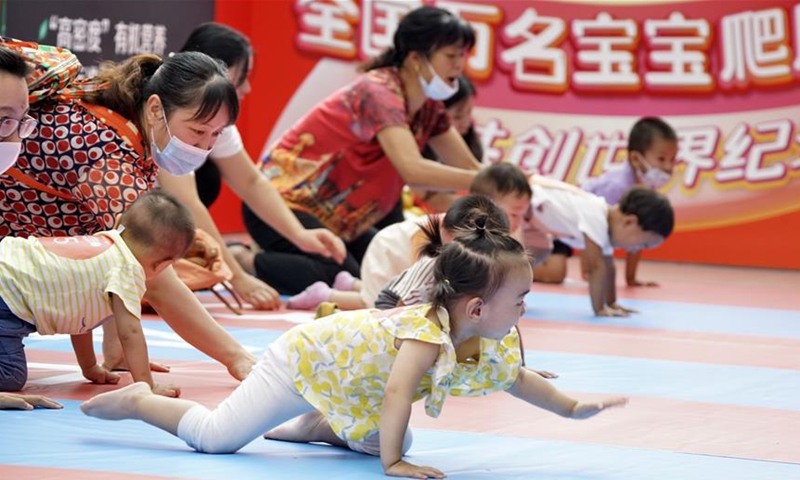China launches survey on marriage and childbearing as country tackles population problem

Parents and their babies participate in a baby crawling contest at a shopping center in Daxing District, Beijing, capital of China, Sept. 13, 2020. (Xinhua/Li Xin)
China has launched a nationwide survey on marriage and fertility in an effort to "objectively and comprehensively" understand the challenges faced by people of marriage and child-bearing age and find solutions as the country has been tackling the population problem with a decline in marriage and fertility rate in recent years.
The survey, conducted by China Population and Development Research Center (CPDRC) and China Family Planning Association, covers 20,000 men and women aged 20-44 in 100 counties, cities and districts across the country, excluding the five western provinces, according to a statement posted by CPDRC.
It mainly focuses on their fertility desire and the influencing factors, the prominent problems they face and their needs in marriage, childbearing and parenting, and related supporting policies and measures, said the statement.
The fertility desire of the survey respondents will be measured by standards based on the sustainable development of population, economy and society. When their desire to have kids is lower than that expected by the society, the survey will look into the subjective reasons for their unsatisfied willingness, and also study the affecting factors, especially how the related policies can improve their fertility intention, it said.
The report of the survey, which was approved by the National Bureau of Statistics, is expected to come out after the 20th National Congress of the Communist Party of China in October, but the date has not been finalized yet, a staffer of the CPDRC told the Global Times on Thursday. The CPDRC has led several demographic projects in China, including conducting the national fertility rate survey and the national population and family planning surveys.
Notably, the survey not only focuses on the difficulties in giving birth and raising children in China's urban areas, which has been a hot topic in recent years, but also focuses on the problems of unmarried people in China's rural areas who are relatively older than average age for marriage.
Song Jian, a demographer from the Center for Population and Development Studies of the Renmin University of China, who also conducted a national fertility survey which started last year, told the Global Times on Thursday that it is generally not easy to study those who originally come from the rural areas and the survey result would be "very interesting" to see.
Women of childbearing age in China have a low desire to have children, and the country's total population will see negative growth during the 14th Five-Year plan (2021-25) period, said a report that the NHC released on August 1. It also noted that the population's development in China is facing profound change, where an aging society with fewer children will become the new normal.
According to the survey of Song's team, the main reasons that hinder couples from having one or more children are whether they have enough support and the family's income level. Compared with providing cash, government preferential policies, such as developing nursery service, will benefit more people in the long run.
China introduced support policies in a guideline that was jointly released by 17 government agencies on August 16 to create a friendly environment for marriage and fertility, and promote population growth, including measures to develop equitable nursery services across the country, as a lack of enough manpower for the care of children is believed to be the primary factor that prevents childbirth.


